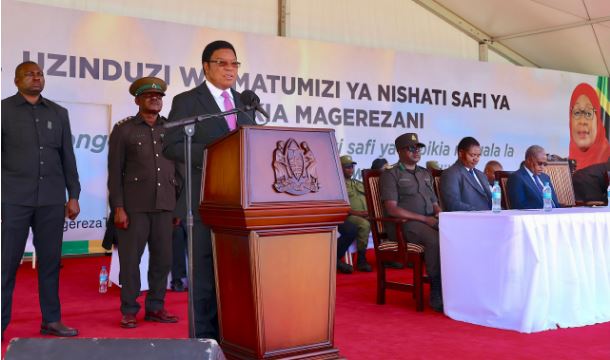THE PRIME MINISTER, Kassim Majaliwa has called on the Ministry of Home Affairs in collaboration with the Ministry of Energy to ensure that all prisons in the country are connected to Clean Energy systems by 2027.
He said the move will greatly help improve services for prisoners, protect the health of prison staff and residents as well as preserve the environment.
He made the call on August 30, 2025 when he represented the President, Dr. Samia Suluhu Hassan at the launch of the use of Clean Energy for Cooking in Prisons in the country. The launch was held on behalf of all prisons in the country.
Mr. Majaliwa said that the launch is an implementation of the strategy to move away from unhygienic fuels and move towards the use of Clean Energy for cooking.
“Our President Dr. Samia is recognized in Africa and the world at large for his enthusiasm for the use of clean energy, this step has shown in action that you support him”
“Statistics show that one prison can use more than 100 tons of charcoal per year, worth more than 60 million shillings. Through clean energy, these costs will be reduced by more than 50 percent.”
He stressed that the step is commendable because it supports the vision of President Dr. Samia to ensure that the entire community uses this energy and thus largely eliminate the harms resulting from the use of unclean energy.
He added that studies by the World Health Organization (WHO) show that wood and charcoal smoke contain dangerous chemicals that can cause respiratory diseases such as pneumonia, chronic cough and asthma.
“By reducing the use of these fuels, the Prison Service directly contributes to improving the climate inside prisons, increasing the productivity of staff and ensuring the well-being of prisoners”, he said
Mr. Majaliwa has called on the private sector to increase creativity and investment in affordable and safe cooking technologies, in order to accelerate the availability of better solutions for more citizens.
“Also, the Ministry of Finance and Industry and Trade, ensure that you set a friendly balance of policies, taxes and systems for investment in Clean Cooking Energy. Likewise, Every Institution, Every Community, and Every Citizen has a role in the use of clean energy. Let us take action today, for the benefit of tomorrow of our children and future generations”, he said
The Minister of Home Affairs, Mr. Daniel Sillo, has said that the project that was launched will greatly help in the care of the environment and cooks in prisons in the country.
“Our prison service has successfully implemented 100 percent clean energy use in prisons”, he said
The Commissioner General of the Prison Service, Jeremiah Katungu, said that for decades the Prison Service has been using firewood as cooking fuel and the firewood requirement was an average of 91,391.25 cubic meters per year.
He said that by December 2024, all prisons in the country had started using clean energy for cooking food for prisoners and detainees.
“So far, the sources of alternative energy used in prisons are Biogas, Briquettes, Hot Wood and Natural Gas”, he said
The Chairman of the Rural Energy Board (REB) Hon. Ambassador Major General (Retd) Jacob Kingu has said that the Rural Energy Agency signed a contract worth 35.2 billion shillings for the provision of subsidies to facilitate the use of clean cooking energy for all prisons in Tanzania.
“We, REA, are providing 26.5 billion shillings, equivalent to 75.4 percent, and the Prisons Service is contributing 8.6 billion shillings, equivalent to 24.6 percent,” he said.
He said the funds will be used to build 126 biogas infrastructure and 377 bio-stoves, build 64 LPG infrastructure and 256 bio-stoves, distribute 15, 126 15-kilogram gas cylinders, purchase 61 alternative charcoal making machines for 22 Prisons Service camps, as well as distribute 865 tons of coal and 344 bio-stoves.
Speaking while reporting on the project to the Prime Minister, the Manager of the Agriculture, Livestock and Environmental Management Unit from the Prisons Service, SACP Daimu Mmolosha, said the aim of the service is to ensure that there is more than one source of energy to avoid the use of charcoal.




